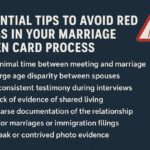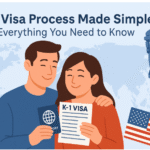Green Card Interview Success: Everything You Need to Know to Prepare and Win Your Case
Applying for a green card is a major milestone—and the interview can feel like the final boss battle. But with the right preparation, you can walk in with confidence and walk out a step closer to permanent residency. In this guide, we’ll walk you through everything you need to know to ace your green card interview—from what to expect to what to bring, say, and wear.

1. What Happens at the Green Card Interview?
The green card interview is where USCIS (U.S. Citizenship and Immigration Services) confirms the legitimacy of your application. If you’re applying from within the U.S., you’ll likely be scheduled at a local USCIS field office.
- Marriage-based applicants: Both spouses must attend.
- Employment or family-based applicants: Usually, only the principal applicant attends.
At the interview, the officer will verify your identity, review your documents, and ask questions about your background, relationship (if applicable), and eligibility. The tone may be friendly—or very formal—depending on the complexity of your case.
Bottom line: Be ready, be organized, and be honest.
2. Most Common Green Card Interview Questions
USCIS officers often ask:
- When and where did you meet your spouse?
- What’s your spouse’s favorite food?
- Who was at your wedding?
- Who cooks in your home?
- What time do you usually wake up?
Questions will vary depending on your application type. For marriage-based green cards, expect personal questions about your relationship. For employment-based cases, be prepared to explain your job, salary, and employer.
Pro Tip:
USCIS checks for consistency—between your answers, your spouse’s answers, and your application. Be truthful and aligned.
3. Document Checklist for Your Green Card Interview
Documents are your strongest evidence. Bring both originals and copies of:
- Passport
- Birth certificate
- Marriage certificate (if applicable)
- I-94 record
- Employment Authorization Document (EAD)
- All USCIS appointment notices
If married, also include:
- Joint bank and utility statements
- Lease/mortgage agreements
- Photos together (labeled with names and dates)
- Insurance and tax filings
- Travel itineraries
Pro tip: Organize everything in clearly labeled folders. If anything’s changed since you filed—new address, new job, new baby—bring updated proof.
4. How to Prove Your Marriage Is Real
Marriage-based interviews get extra scrutiny to detect fraud. Here’s how to show your relationship is genuine:
- Financial ties: Joint accounts, shared insurance
- Residential ties: Lease agreements, shared mail
- Personal ties: Photos, love letters, messages
- Social ties: Invitations, witness statements from friends/family
Don’t overthink it. You don’t need a “perfect” love story—just a real one.
Be real, not rehearsed.
Officers want to see a natural connection, not memorized answers. If there’s anything that might raise questions (age gap, short courtship, language barrier), be ready to explain openly.
5. First Impressions Matter: What to Wear & How to Act
Your behavior speaks volumes before you even say a word. Follow these simple rules:
- Dress respectfully: Business casual is great. No sneakers, no flashy outfits.
- Arrive early: At least 30 minutes before your scheduled time.
- Turn off your phone and be courteous.
- Speak clearly and use your native language if needed (you can bring an interpreter).
- Be calm: Don’t argue or joke—even if a question seems awkward.
For couples: Avoid overacting or seeming overly rehearsed. Just be yourselves.
6. Should You Bring an Immigration Attorney?
Yes—especially if your case is complex.
A good immigration attorney can:
- Prepare you with a mock interview
- Flag weak points in your case
- Help organize your documents
- Step in if a question is inappropriate or your rights are at risk
While the attorney can’t answer for you, their presence shows you’re serious—and can keep the process fair.
7. How USCIS Detects Fraud: Common Red Flags
Here’s what USCIS looks for when evaluating credibility:
- Inconsistent answers
- Living at different addresses
- Not knowing basic facts about your spouse
- Lack of joint documents
- Gaps in your immigration history (e.g., overstays, prior denials)
Even honest applicants make mistakes. The key is to be transparent. If there’s something unusual in your case, explain it—don’t hide it.
8. What Happens After the Interview?
There are three common outcomes:
- ✅ Approval: You may get approved on the spot or by mail within a few weeks.
- 📨 RFE (Request for Evidence): USCIS needs more documents. Respond promptly.
- 📅 Second Interview: Especially common in marriage cases if there are concerns.
Delays are normal. Track your case status online using the USCIS case tracker.
9. The Stokes Interview: What to Expect If You’re Called Back
If your marriage case raises concerns, USCIS may schedule a Stokes interview—a second, more intense session where you and your spouse are interviewed separately.
Expect very specific questions like:
- What did your spouse wear to bed last night?
- Which side of the bed do you sleep on?
- Who takes out the trash?
- What’s your spouse’s Netflix password?
Tip: Don’t guess. Just answer honestly—even if you forget a detail. Bring updated evidence and review your case with your attorney in advance.
10. FAQs About Green Card Interviews
How long is the interview?
20–45 minutes. A Stokes interview can take over 2 hours.
Can I bring a translator?
Yes—just notify USCIS ahead of time.
What if I make a mistake?
Minor errors are fine. Correct yourself calmly and stay consistent overall.
What if my case is denied?
You may be placed in removal proceedings or given the chance to reapply. Talk to an attorney immediately.
Should I bring my child?
Only if the child is part of the application.
How do I check my case status?
Visit USCIS Case Tracker and enter your receipt number.
Final Thoughts
The green card interview isn’t something to fear—it’s something to prepare for. With the right documents, honest answers, and a confident mindset, you can navigate the process smoothly. If you’re unsure, an immigration attorney can help guide you.
Success is in the details. And now, you’ve got them.
Need help preparing for your interview?
Leave a comment or contact me for guidance, resources, or legal referrals.



